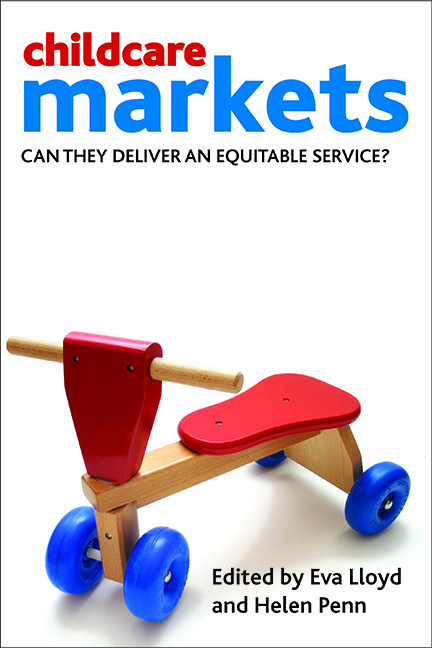six - Markets and childcare provision in New Zealand: towards a fairer alternative
Published online by Cambridge University Press: 01 September 2022
Summary
Introduction
Early childhood education and care (ECEC) policy designs reflect views about young children, about the roles and responsibilities of parents, community and the state, and about the value and purposes of early childhood education (OECD, 2001, 2006; Rigby et al, 2007). Roles that the state chooses to play have consequences for the nature of early childhood provision and the experiences of children and families. These roles include whether to directly provide ECEC services or allow the market to provide, what standards to set in regulation, and how to deliver funding.
A useful categorisation of state support, developed by New Zealand’s Royal Commission on Social Policy (1988), distinguishes between a minimal state and a supportive state. In a situation of minimal state involvement the family is largely responsible for dependants, and the state intervenes only where the family cannot provide. Where children are viewed as dependants and the upbringing of young children is regarded as a private responsibility, governmental responsibility is often limited to the ‘needy’ and ‘disadvantaged’. A minimal state approach favours market provision, targeted funding and low regulated standards. In a supportive state, ECEC is seen as a cooperative effort between the family and the state. Policies are developed around the idea that children are a distinct social group who are citizens with their own associated rights. These ideas are in keeping with those of the OECD (2001, 2006) which has argued that a systematic and integrated approach to policy development and implementation calls for a vision for children, from birth to 8 years, and coordinated policy frameworks: a supportive state.
New Zealand governments have never played a direct role in fully supporting ECEC, and no services are state owned. Nevertheless, a transformation to a more supportive state (Mitchell, 2005) which began during the 1980s, had starts and setbacks during the 1990s and emerged strongly under a Labour-led government from 1999 to 2008. In that decade, fundamental shifts occurred in government resourcing of early childhood education and in policies to support a coherent national framework of curriculum, regulations and funding. At the same time legacies from the neoliberal reforms of the 1980s and 1990s remained, and a market approach to ECEC planning and provision still predominates today, with some exceptions.
- Type
- Chapter
- Information
- Childcare MarketsCan They Deliver an Equitable Service?, pp. 97 - 114Publisher: Bristol University PressPrint publication year: 2012

